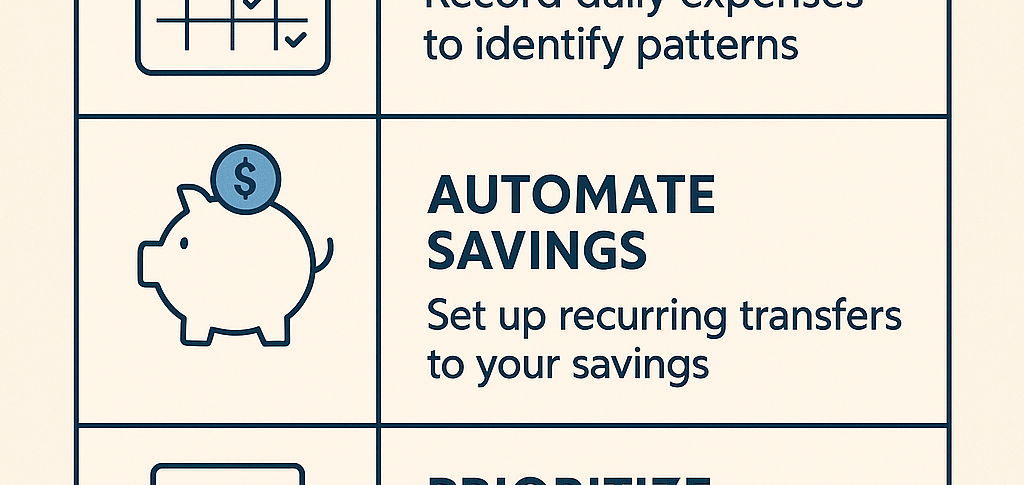The Busy Professional
Easy tips to manage your finances
4/1/20253 min read


"The Busy Professional's Guide to Effortless Budgeting: 10-Minute Routines to Take Control of Your Finances"
For busy professionals, managing finances can feel like an overwhelming task. Between meetings, deadlines, and personal commitments, finding time to budget often falls to the bottom of the priority list. However, financial discipline doesn’t have to mean hours of number-crunching or sacrificing your work-life balance. By incorporating efficient, bite-sized techniques into your daily routine, you can take control of your finances without adding stress to your already packed schedule. Here’s how to make budgeting work for you, even with limited time.
Why Budgeting Matters for Professionals
Financial discipline is the foundation of long-term stability and peace of mind. For professionals, it’s especially critical because irregular hours, unexpected expenses (like client dinners or travel), and the pressure to maintain a certain lifestyle can quickly derail financial goals. A well-managed budget helps you:
Avoid living on credit
Build an emergency fund for unexpected challenges.
Save for big goals, like buying a home or taking a dream vacation.
Reduce financial stress, allowing you to focus on your career and personal life.
The good news? You don’t need hours to stay on top of your finances. With the right strategies, you can manage your money in just a few minutes a day.
Bite-Sized Budgeting Techniques for Daily Routines
Here are practical, time-efficient techniques that seamlessly integrate into your busy schedule:
The 2-Minute Morning Check:
Start your day by glancing at your bank account balance and recent transactions using your banking app. This quick check keeps you aware of your spending patterns and helps you spot any unusual activity (like subscriptions you forgot to cancel).
Automate Your Savings with the 5-Minute Rule:
Set up automatic transfers to your savings account for the same day each month (e.g., the day after payday). Spend five minutes reviewing and adjusting the amount if needed. Automation removes the burden of manually saving, ensuring you’re consistently building your financial cushion.
Track Expenses with a 1-Minute Evening Habit
At the end of each day, jot down your expenses in a budgeting app or a simple note on your phone. Focus on discretionary spending like dining out or online purchases. This habit keeps your spending in check without requiring a deep dive into your finances.
Set Weekly Micro-Goals During Your Commute
While commuting (or during a 5-minute break), set one small financial goal for the week, like “spend less than xyz amount on takeout” or “transfer xyz amount to savings”. Micro-goals are achievable and keep you motivated without overwhelming your schedule.
Use the “One-Touch” Rule for Bills
When you receive a bill, handle it immediately—either pay it or schedule the payment in under two minutes. This prevents late fees and reduces the mental clutter of unpaid bills piling up.
Plan Meals in 5 Minutes to Avoid Impulse Spending
Once a week, spend five minutes planning your meals and making a grocery list. Stick to the list when shopping. Meal planning reduces the temptation to order takeout, which can be a major budget buster for busy professionals.
Maintaining Work-Life Balance While Budgeting
The key to financial discipline as a busy professional is to avoid letting budgeting consume your limited free time. Here’s how to ensure it doesn’t disrupt your work-life balance:
Leverage Technology: Use apps and automation to handle the heavy lifting of budgeting. Various online tools can provide real-time insights without requiring constant attention.
Set Boundaries: Dedicate specific times for financial tasks (e.g., a 10-minute routine each morning or evening) and avoid obsessing over your budget throughout the day.
Celebrate Small Wins: Acknowledge your progress, like sticking to your weekly micro-goal or saving an extra bucks. This keeps you motivated without feeling deprived.
Schedule “No-Budget” Days: Give yourself one day a week where you don’t think about money—just enjoy your time off. This prevents burnout and keeps your routine sustainable.
The Power of Consistency
These bite-sized techniques work best when done consistently. Over time, they’ll become second nature, allowing you to maintain financial discipline without sacrificing your career or personal life. The goal isn’t perfection—it’s progress. Even small, daily actions can lead to significant financial growth, giving you the freedom to focus on what matters most.
Registration Granted By SEBI (INA000020208), Membership Of BASL (BASL2266), And Certification From NISM In No Way Guarantee Performance Of The Intermediary Or Provide Any Assurance Of Returns To Investors. Investment In Securities Market Are Subject To Market Risks. Read All The Related Documents Carefully Before Investing. We are Fee Only Advisers. We prioritize customer over commission.
Copyright © 2025 Neha Sinha - All Rights Reserved.
